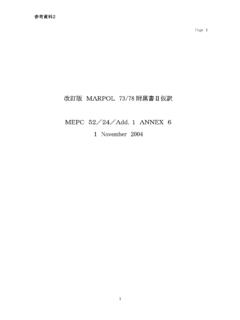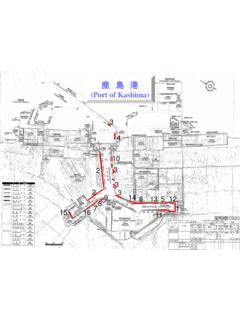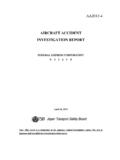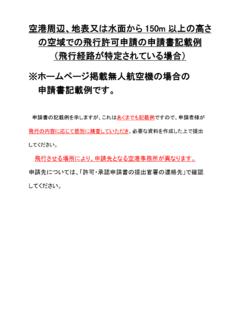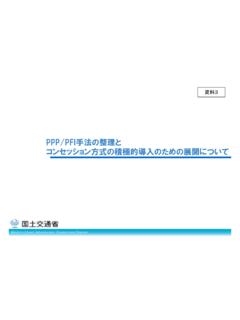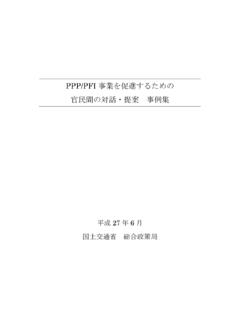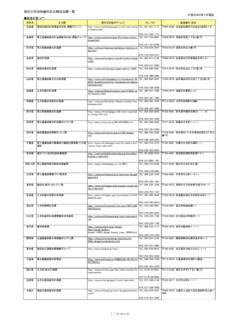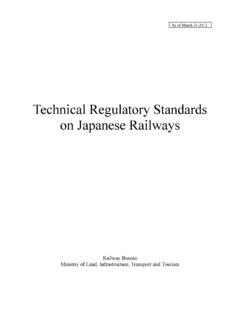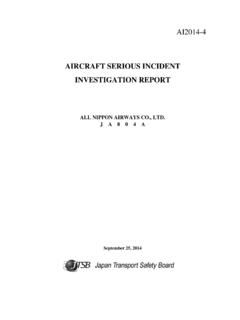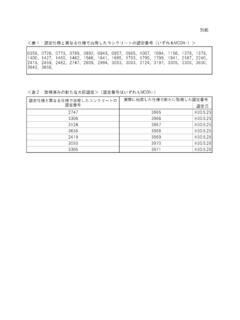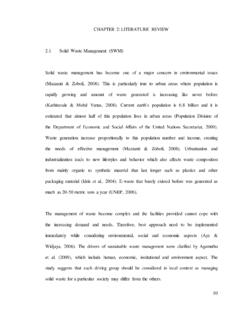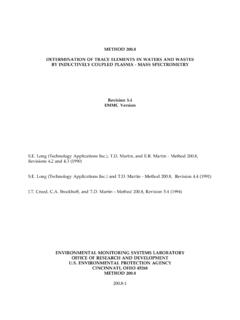Transcription of ANNEX AMENDMENTS TO THE INTERNATIONAL MARITIME …
1 - 2 - ANNEX AMENDMENTS TO THE INTERNATIONAL MARITIME solid BULK CARGOES (IMSBC) CODE AMENDMENT 05-19 (Consolidated version of the IMSBC Code) The complete text of the IMSBC Code is replaced by the following: "Table of contents Foreword Section 1 General provisions Section 2 General loading, carriage and unloading precautions Section 3 Safety of personnel and ship Section 4 Assessment of acceptability of consignments for safe shipment Section 5 Trimming procedures Section 6 Methods of determining the angle of repose Section 7 Cargoes which may liquefy Section 8 Test procedures for cargoes which may liquefy Section 9 Materials possessing chemical hazards Section 10 Carriage of solid wastes in bulk Section 11 Security provisions Section 12 Stowage factor conversion tables Section 13 References to related information and recommendations Appendix 1 Individual schedules of solid bulk cargoes Appendix 2 Laboratory test procedures, associated apparatus and standards Appendix 3 Properties of solid bulk cargoes Appendix 4 Index Appendix 5 Bulk Cargo Shipping Names in three languages (English, Spanish and French)
2 - 3 - General provisions Introductory note It should be noted that other INTERNATIONAL and national regulations exist and that those regulations may recognize all or part of the provisions of this Code. In addition, port authorities and other bodies and organizations should recognize the Code and may use it as a basis for their storage and handling by-laws within loading and discharge areas. Cargoes listed in this Code Typical cargoes currently shipped in bulk, together with advice on their properties and methods of handling, are given in the schedules for individual cargoes. However, these schedules are not exhaustive and the properties attributed to the cargoes are given only for guidance. Consequently, before loading, it is essential to obtain current valid information from the shipper on the physical and chemical properties of the cargoes presented for shipment. The shipper shall provide appropriate information about the cargo to be shipped (see ).
3 Where a solid bulk cargo is specifically listed in appendix 1 to this Code (individual schedules for solid bulk cargoes), it shall be transported in accordance with the provisions in its schedule in addition to the provisions in sections 1 to 10 and of this Code. The master shall consider whether to consult the authorities at the ports of loading and discharge, as necessary, concerning the requirements which may be in force and applicable for the carriage. Cargoes not listed in this Code If a solid cargo which is not listed in appendix 1 to this Code is proposed for carriage in bulk, the shipper shall, prior to loading, provide the competent authority of the port of loading with the characteristics and properties of the cargo in accordance with section 4 of this Code. Based on the information received, the competent authority will assess the acceptability of the cargo for safe shipment. When it is assessed that the solid bulk cargo proposed for carriage may present hazards as those defined by group A or B of this Code as defined in , advice is to be sought from the competent authorities of the port of unloading and of the flag State.
4 The three competent authorities will set the preliminary suitable conditions for the carriage of this cargo. When it is assessed that the solid bulk cargo proposed for carriage presents no specific hazards for transportation, the carriage of this cargo shall be authorized. The competent authorities of the port of unloading and of the flag State shall be advised of that authorization. The competent authority of the port of loading shall provide to the master a certificate stating the characteristics of the cargo and the required conditions for carriage and handling of this shipment. The competent authority of the port of loading shall also submit an application to the Organization, within one year from the issue of the certificate, to incorporate this solid bulk cargo into appendix 1 of this Code. The format of this application shall be as outlined in Format for the properties of cargoes not listed in this Code and conditions of the carriage Tentative bulk cargo shipping name (in capital letters) Description (Describe the cargo) - 4 - Characteristics (Fill the following table) Physical properties Size Angle of repose Bulk density (kg/m3) Stowage factor (m3/t) Hazard classification Class Subsidiary hazard(s) MHB Group Hazard (Clarify the hazard of carriage of the cargo) (Determine the following types of requirements.)
5 If no requirement is necessary, write "No special requirements") Stowage and segregation Hold cleanliness Weather precautions Loading Precautions Ventilation Carriage Discharge Clean-up (Specify the emergency procedures for the cargo, if necessary) Emergency procedures Special emergency equipment to be carried Emergency procedures Emergency action in the event of fire Medical first aid Application and implementation of this Code The provisions contained in this Code apply to all ships to which the SOLAS Convention, as amended, applies and that are carrying solid bulk cargoes as defined in regulation 1-1 of part A of chapter VI of the Convention. - 5 - Although this Code is legally treated as a mandatory instrument under the SOLAS Convention, the following provisions of this Code remain recommendatory or informative: Section 11 Security provisions (except ); Section 12 Stowage factor conversion tables; Section 13 References to related information and recommendations; Appendices other than appendix 1 (Individual schedules of solid bulk cargoes) and appendix 5 (Bulk Cargo Shipping Names in three languages (English, French and Spanish)); and The texts in the sections for "Description", "Characteristics (other than Hazard classification)", "Hazard" and "Emergency procedures" of individual schedules of solid bulk cargoes in appendix 1.
6 In certain parts of this Code, a particular action is prescribed, but the responsibility for carrying out the action has not been specifically assigned to any particular person. Such responsibility may vary according to the laws and customs of different countries and the INTERNATIONAL conventions into which these countries have entered. For the purpose of this Code, it is not necessary to make this assignment, but only to identify the action itself. It remains the prerogative of each Government to assign this responsibility. Exemptions and equivalent measures Where this Code requires that a particular provision for the transport of solid bulk cargoes shall be complied with, a competent authority or competent authorities (port State of departure, port State of arrival or flag State) may authorize any other provision by exemption if satisfied that such provision is at least as effective and safe as that required by this Code.
7 Acceptance of an exemption authorized under this section by a competent authority not party to it is subject to the discretion of that competent authority. Accordingly, prior to any shipment covered by the exemption, the recipient of the exemption shall notify other competent authorities concerned. A competent authority or competent authorities which have taken the initiative with respect to the exemption: .1 shall send a copy of such exemption to the Organization, which shall bring it to the attention of the Contracting Parties to SOLAS; and .2 shall take action to amend this Code to include the provisions covered by the exemption, as appropriate. The period of validity of the exemption shall be not more than five years from the date of authorization. An exemption that is not covered under may be renewed in accordance with the provisions of this section. A copy of the exemption or an electronic copy thereof shall be maintained on board each ship transporting solid bulk cargoes in accordance with the exemption, as appropriate.
8 Contact information for the main designated national competent authorities concerned is given in the separate document issued by the Organization. - 6 - Conventions Parts A and B of chapter VI and part A-1 of chapter VII of the SOLAS Convention, as amended, deal with the carriage of solid bulk cargoes and the carriage of dangerous goods in solid form in bulk, respectively, and only the relevant parts are reproduced below. This extract incorporates AMENDMENTS that entered into force on 1 January 2011. "Chapter VI Carriage of cargoes and oil fuels Part A General provisions Regulation 1 Application 1 Unless expressly provided otherwise, this chapter applies to the carriage of cargoes (except liquids in bulk, gases in bulk and those aspects of carriage covered by other chapters) which, owing to their particular hazards to ships or persons on board, may require special precautions in all ships to which the present regulations apply and in cargo ships of less than 500 gross tonnage.
9 However, for cargo ships of less than 500 gross tonnage, the Administration, if it considers that the sheltered nature and conditions of voyage are such as to render the application of any specific requirements of part A or B of this chapter unreasonable or unnecessary, may take other effective measures to ensure the required safety for these ships. 2 To supplement the provisions of parts A and B of this chapter, each Contracting Government shall ensure that appropriate information on cargo and its stowage and securing is provided, specifying, in particular, precautions necessary for the safe carriage of such cargoes. Regulation 1-1 Definitions For the purpose of this chapter, unless expressly provided otherwise, the following definitions shall apply: 1 IMSBC Code means the INTERNATIONAL MARITIME solid Bulk Cargoes (IMSBC) Code adopted by the MARITIME Safety Committee of the Organization by resolution (85), as may be amended by the Organization, provided that such AMENDMENTS are adopted, brought into force and take effect in accordance with the provisions of article VIII of the present Convention concerning the amendment procedures applicable to the ANNEX other than chapter I.
10 2 solid bulk cargo means any cargo, other than liquid or gas, consisting of a combination of particles, granules or any larger pieces of material generally uniform in composition, which is loaded directly into the cargo spaces of a ship without any intermediate form of containment. Regulation 1-2 Requirements for the carriage of solid bulk cargoes other than grain The carriage of solid bulk cargoes other than grain shall be in compliance with the relevant provisions of the IMSBC Code. - 7 - Regulation 2 Cargo information 1 The shipper shall provide the master or his representative with appropriate information on the cargo sufficiently in advance of loading to enable the precautions which may be necessary for proper stowage and safe carriage of the cargo to be put into effect. Such information shall be confirmed in writing and by appropriate shipping documents prior to loading the cargo on the ship.
